Reply To:
Name - Reply Comment
Last Updated : 2024-04-26 02:08:00
 enlighten the public on the current constitution making process, the concerns related to it and how constitutional reform of which devolution is considered to be an integral part would affect the country. The event ended however on evidencing the fact that the process although hopeful is entwined with diverse opinions and confusions. Excerpts from the panelists’ speeches follow
enlighten the public on the current constitution making process, the concerns related to it and how constitutional reform of which devolution is considered to be an integral part would affect the country. The event ended however on evidencing the fact that the process although hopeful is entwined with diverse opinions and confusions. Excerpts from the panelists’ speeches follow
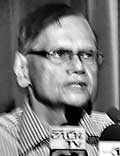 Prof.G.L.Pieris- Chairman of Sri Lanka Podu Jana Peramuna
Prof.G.L.Pieris- Chairman of Sri Lanka Podu Jana PeramunaSpeaking at the event Prof.G.L.Pieris, the Chairman of Sri Lanka Podu Jana Peramuna said that the entire process of constitutional reform was grinding to a halt or slowing down substantially. “Something that began with great deal of promise, seems to be almost petering out,” he said.
Examining the reasons for this phenomenon he said the reasons were not entirely connected to legal or constitutional issues, and that the present situation had to be evaluated in a broader
social context.
“Today the reluctance to hold a referendum derives from a number of factors. The Government does not have the confidence that the people will endorse what they put before the country. One of the main reasons for this is the widespread perception that this is a corrupt government- possibly the most corrupt since independence,” he said. He added that there were a series of horrendous frauds that would be taken into consideration when voting at a referendum.
“The referenda conducted in the United Kingdom and Italy also bare testimony to the truth that people lose a referenda to express their views on a wide range of issues connected with the popularity and acceptability of the incumbent administration,” he said. He noted that there was a total lack of clarity with regard to what is proposed by the Government in the Constitution making process. Pointing out that the President imposed upon himself a certain limitation on the parameters and the scope of the proposed constitutional reform Prof. Pieris said-“His position was that he would undertake those which are capable of being effected with a two thirds majority in parliament, but without the legal necessity of holding and winning a referendum.”
However he pointed out that the President had made conflicting and contradicting statements.
Emphasising that the abolition of the Executive Presidency required a referendum he said there were fundamental divergence of opinions within the government itself.
“You cannot begin to undertake a serious process of constitutional reform unless there is a consensus with regard to basics. If you look at statements made every day by leaders of the government they simply cannot be reconciled one with the other,” he said.
“Powerful personalities within the SLFP say that there is no mandate for a completely new constitution, nor do we need one. All that is required is to address certain burning issues which can be adequately catered for by means of a 20th Amendment. A principle area which according to them is urgently in need of reform is on elections,” he added.
However he pointed out that the UNP are for a completely new constitution and for holding a referendum.
Prof. Pieris claimed that there was much confusion as to whether Sri Lanka was embarking upon a new constitution or changes to the existing constitution. “Who wants what? What is the truth? What is camouflaged?” he quizzed.
“There is the problem of simulation of hypocrisy. There are political parties that openly say that they have serious reservations about the unitary state. But this differs to the view presented by the government,” he said. Elaborating further he said, “Under the existing constitution the governor of a province is alter ego of the president- he is the representative of the president in the relevant part of the country. Today the governor has the power with regard to legislation that is passed by the provincial council. It is now proposed in the report on the Central Periphery relations that the governor should be responsible not to the President but to the Chief Minister and to the board of ministers. Between the president and the governor is what enables the President to exercise his authority all over the country.”
Prof. Pieris said that effecting those reforms and maintaining that Sri Lanka remained a unitary state was disingenuous and hypocritical, as it was unitary in name and not in substance.
“Lord Buddha says that when you have had an excruciatingly painful past with regard to a certain matter and you are now determined to forge ahead with your life, do not dwell on that problem in such a way as to perpetuate the pain and the anguish. Move on,” he said.
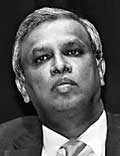 Tamil National Alliance MP M. A. Sumanthiran
Tamil National Alliance MP M. A. Sumanthiran “What has reconciliation got to do with the Constitution? It has everything to do with it. The whole national question took a violent turn only with the enactment of the 1st Republican Constitution. The party I belonged to in 1970 specifically called on the Tamil people not to vote for a candidate calling for a separate State. But by 1972 when this Constitution displayed majoritarianism the representation of the Tamil people’s’ voice was shut out and excluded from the national life of the country.
“This is because when the 1972 Constitution proclaimed Sinhala as the official language it excluded everyone else and relegated others to second class. There was no equal citizenship right to the people of the country. When it elevated Buddhism to the foremost place it was an exclusion, again. By the enactment of this Constitution everyone other than a Sinhalese and a Buddhist was excluded from the national life of the Country. Tinkering was done later on when Tamil was also included as a language but Article 9 remains”
He then went on to analyse the presence of the Tamil population in a state where they are not the majority.
“It is the majority vote that will always hold sway. Whenever issues arose between communities by fact that one community was a preponderant majority it would always sway that way. Majority rule is a creature of democracy but that is not all. There are fundamentals that cannot be taken away. In 1949 Tamil leaders who, until then rejected idea of a Federal state woke up, so a party that specifically asked people not to vote for separation would join with other Tamil parties and pass a resolution to restore the loss of a Federal state.
“We have now come a long way from that. Because in the last several years we have repeatedly got the mandate from the Tamil people to find a solution within an undivided country irrespective of other formations who have canvassed and told Tamil people not to trust Sinhala leaders. It is the TNA’s manifesto which said one undivided country upon a sharing arrangement so that the imbalance created by the majority that is always ruling is redressed to ensure that at least in areas we are a majority some of the day to day matters can be decided by us.
It is a matter of record that after the 13th Amendment there have been several processes having substantial consensus including the Constitutional Bill of 2000.
“We passed a resolution on 9 March last year which was unanimous even with the Joint Opposition which clearly speaks of the process of forming a constitutional assembly and other sub-committees and says that at the end of it, it will receive a report and a draft Constitution Bill. When the President announced his candidature in 2014 he gave three promises. The first of them was abolishing the executive presidency.
“In January 2016 also he made a speech and articulated his position and two speeches later he spoke about a new Constitution which should have the approval of the people at a referendum. The present process is not one of the Government proposing something only for someone to knock it down. When the 19th Amendment was passed in Parliament and at the Committee Stage it was repeatedly said that this was merely a stop gap and that we would have a new Constitution after the election. So that process is on and as far as we are concerned reconciliation is important. We don’t want it behind the backs of the Sinhala people but we want them to approve the changes of the constitution. We want a process that is transparent and that is clear”
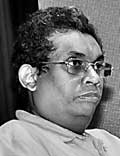 President’s Counsel and Constitutional expert Manohara de Silva
President’s Counsel and Constitutional expert Manohara de Silva“There must be a mechanism in which the minority rights are protected. But is Federalism the solution? In a Unitary State if the majority community of the country rules the minority, is it the solution to say that in a regional unit we should reverse the roles and allow the minority of the country to rule the majority of the country in a region? This is not reconciliation,” said President’s Counsel Manohara De Silva.
He added that the allegation that the people of this country were dominating the minority community in a manner that infringes their rights was not acceptable.
“If one suggests that a mechanism should be formulated for the protection of the minorities it is a different question. But Federalism is certainly not the solution,” he said. Reiterating Prof. Peiris’ concern that attempts to prepare a new constitution have failed De Silva said a main reason was that the people did not trust the government.
“People did not trust any of the past governments either in constitutional reform. This is because the majority community did not participate in any of the constitutional amendments that were brought in the last 30 to 40 years,’ he said.
Elaborating he asked as to what extent the people participated in drafting the 13th Amendment.
“It was drafted under the directions of the Indian government for those who were promoting Federalism, against the wishes of the people of this country. Many died fighting against the 13th Amendment. No Government fully implemented 13A because it is not a piece of legislation that received the approval of the people of this country,” he added.
“The 19th Amendment was passed by announcing that the abuse of power, corruption can be eradicated with its passing. We were told that the Presidential System of governance is bad, that president deciding on major issues is not advisable and therefore the powers of the President should be vested. They said if the President appoints people to various offices including the Chief Justice, Judges of the Supreme Court and court of appeal and the IGP that he will appoint his friends and relatives or his political affiliates. The very people who promote the curtailment of power being exercised by the President did not make any attempt to curtail the power of the Chief Minister,” he said.
“Under 13A the Police force in a province is under the control of the Chief Minister. If the President appoints the IGP it is bad, but if the Chief Minister of a Province appoints and controls the Police force that’s good,” said De Silva on a sarcastic note.
“Though they pledged to do away with the Presidential system of Governance, they did not amend Article 4 which gave executive power to the president because they wanted to avoid a referendum. They suggested that the powers of the president, especially in relation to the appointment of the Cabinet of Ministers, be given to the Prime Minister. In place of the President who has been voted by the majority of people of all communities of this country, the PM who is appointed by the people of the Colombo district was preferred. Fortunately the Supreme Court did not approve the suggestion made,” he said.
Stating that the 19th Amendment took away the rights of the majority he said that there is no support for the constitution amending process because most of the members of the Constitutional Council are either supportive of the minority cause, or are race and religion based.
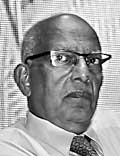 Dr. K. Vigneswaran - Member of Expert Panel to the APRC
Dr. K. Vigneswaran - Member of Expert Panel to the APRCAfter detailing his experiences with 13th amendment, Vigneswaran went on to speak about reconciliation.
“Irrespective of the 13th Amendment there has been an unwillingness of the Presidents to part with the powers given by the Amendment. Some sort of external pressure is required if we are unwilling to do things from within. With regards to reconciliation, if you go to the airport the announcements are only in Sinhala and English. Are there no Tamil passengers? Even in the railway stations, other than maybe Fort, the announcements are not in Tamil. In the courts in Trincomalee the plaints are filed only in Sinhala although Tamil is the official language there.
Take the Police, the 13th Amendment says that for a Police officer to get their first promotion he or she must have knowledge of other official language. That doesn’t take place. In Trincomalee he will record statements in Sinhala. This should have been sorted out by now. There is an unwillingness by the Government in respect rights of the Tamils. There is no urgency for solving the problem. Do we want some sort of external pressure? We need to rethink ourselves whether we want the problem solved or we would rather have external forces intervene. We need to think of ourselves as one people and solve our own problems ourselves. The main issue is the unwillingness of the centre to give away power”
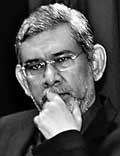 Dr. Dayan Jayatilleka - Former Permanent Representative to the UN
Dr. Dayan Jayatilleka - Former Permanent Representative to the UNAs the sole political scientist of the panel Jayatilleka looked at things externally.
“I will sketch out what I think is the smart change for post war Sri Lanka. Sri Lanka needs constitutional change but not a change of Constitution. I am not satisfied with the status quo but I don’t think this requires a new Constitution. It is the kind of change that is unnecessary and dangerous. I argue for an understanding of the difference between structural and systemic change. The 13th Amendment was a structural reform. I want autonomy through devolution but within the unitary state.
“I have always opposed the CBK packages which took us outside and beyond the unitary framework. Therefore in summary, systemic change: no; structural reform: yes. This is a distinction between reform and replacement. “The Constitution must not be repealed because we have to look at it as a system of state which is democratic, which is a republic, which has a presidential system of leadership and is a unitary form of state. The state system shouldn’t be replaced because it has been a success! This can be seen in comparison to several countries.
Singapore which we have been compared to is a city state and not a country. “East Asia is not a valid comparison since they have Confucian ideologies and have had decades of military dictatorships. We have avoided that. If we look at the rest of the world, India has a terrible system of caste, Pakistan has terrorism, the Middle East has failed states and radical Islamist terrorism, Central Europe has civil wars, and Latin America has violent gangs. We have been a success and have prevailed over the most powerful terrorist movement at the time, retained our sovereignty by sending back 70,000 troops and retained social welfare. We are a success as a state! We recovered faster from the tsunami than Louisiana did from Katrina. The replacement that is sought is looked at through the abolition of the executive Presidency and the unitary form of the State. Both are disastrous.
We refused to go beyond the 13th Amendment. Why should we convert to Federalism? Even in the Geneva Resolution there is no mention of going beyond the 13th Amendment. You have a community which is 74% of the place in a small country unlike the rest of the community that has relations over the world. Therefore geopolitically we shouldn’t go beyond the Unitary State.

Add comment
Comments will be edited (grammar, spelling and slang) and authorized at the discretion of Daily Mirror online. The website also has the right not to publish selected comments.
Reply To:
Name - Reply Comment
US authorities are currently reviewing the manifest of every cargo aboard MV
On March 26, a couple arriving from Thailand was arrested with 88 live animal
According to villagers from Naula-Moragolla out of 105 families 80 can afford
Is the situation in Sri Lanka so grim that locals harbour hope that they coul